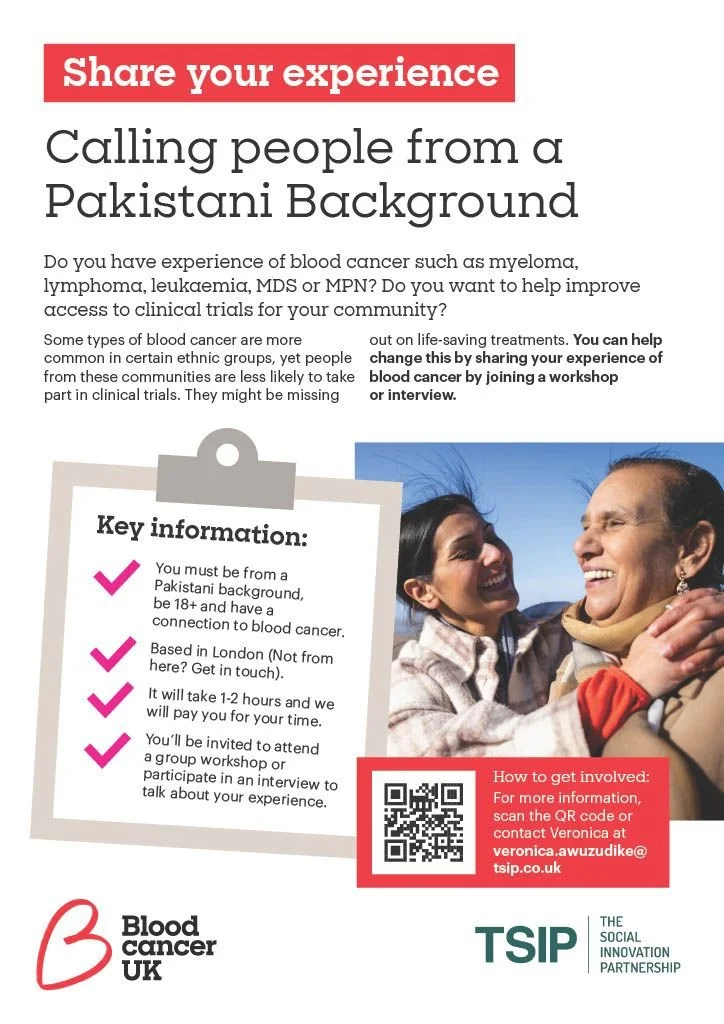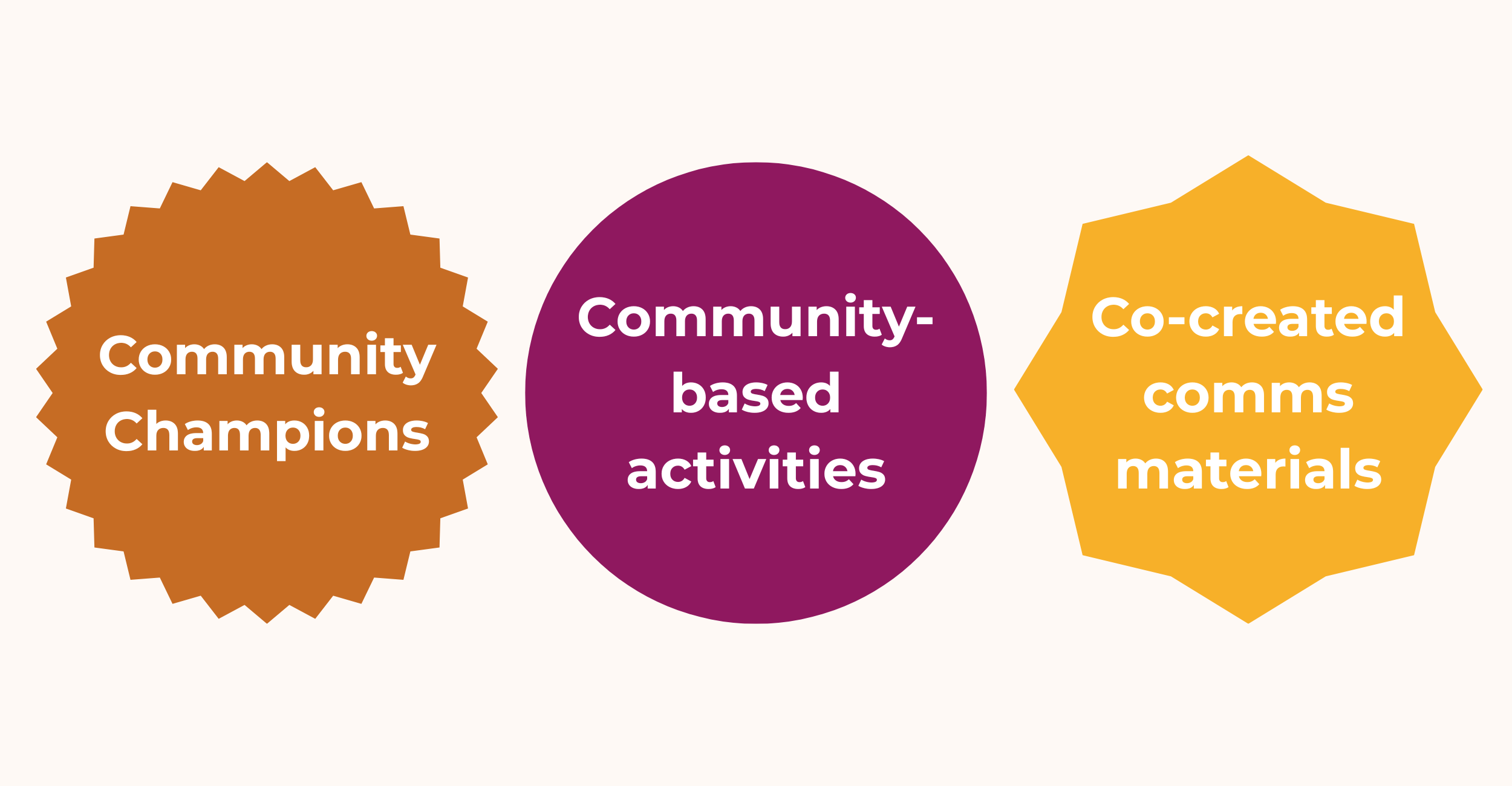Improving access to clinical trials for Black and Pakistani communities
What did we do?
This project set out to address a critical disparity: Black communities are up to three times more likely to develop multiple myeloma and are also at higher risk for certain lymphomas and leukaemias. Pakistani communities show elevated rates of Hodgkin lymphoma, non-Hodgkin lymphoma, and childhood leukaemia. Despite this, both Pakistani and Black Communities remain underrepresented in clinical trials that could improve treatment outcomes. Recognising this, Blood Cancer UK partnered with TSIP to explore how to design a new service that meaningfully improves participation among these communities.
Guided by a commitment to human-centred, community-led design, we undertook a co-design process deeply rooted in lived experiences. From March 2024, we engaged people affected by blood cancer, families, healthcare professionals (HCPs), and community organisations, seeking to understand not just barriers, but also what trust, care, and inclusion should look and feel like.
Rooted in community engagement, the initiative captures key insights, documents the design journey and identifies opportunities for wider systemic change. Guided by a series of core questions, we carried out the project in three phases: Engagement, Co-Design and Prototype Development and Testing.
Our Core Learning Questions
How can we engage Black and Pakistani communities and healthcare professionals (HCPs) using a human-centred approach?
What barriers do these communities face in accessing clinical trials, and how can these be addressed?
How can we ensure that community voices lead the development of solutions?
What strategies can influence the healthcare sector to adopt inclusive and community-led approaches?
How can we build trust and create safe, collaborative spaces that address power dynamics and historical mistrust?
Our project phases and methodology
1 - Engagement: Community Researchers (CRs) were recruited from Black and Pakistani communities with lived experience of cancer. They engaged community members through social networks, local events, and consulted with trusted organisations.
2 - Co-Design: Using the double-diamond design approach, TSIP and Blood Cancer UK facilitated workshops and interviews with people affected by blood cancer, healthcare professionals, and researchers to define key challenges and generate solutions.
3 - Prototype Development and Testing: Ideas were tested and refined with stakeholders to create viable service models that address the identified needs and are ready for piloting.
Each phase is iterative and responsive, allowing space to revisit ideas and adjust approaches based on feedback.
Who DID WE WORK WITH AND WHAT HAVE WE LEARNED?
We worked with a wide range of groups and individuals to co-design a pilot for a new and improved service that breaks down barriers for affected communities to access clinical trials. People we worked with include:
Community organisations.
Individuals from the Black and Pakistani communities with lived experience of blood cancer.
Healthcare professionals (HCP) and researchers, who got involved in interviews and workshops.
A group of community researchers, who were recruited to lead local engagement efforts.
A steering group, who were appointed to help shape and guide this work, made up of 12 people from a range of stakeholders.
Analysing insights from the community, the interviews with healthcare professionals and existing research, we learned the following:
People from Black and Pakistani communities need human-centred, culturally sensitive care to feel safe and supported in engaging with clinical trials.
These communities require clear, accessible, and culturally appropriate information about clinical trials to make informed decisions.
People affected by blood cancer need tailored, ongoing support from diagnosis through to trial participation to help them navigate the process and feel confident.
Healthcare professionals require training, support, and practical tools to deliver inclusive care and communicate effectively across cultural contexts.
How did the final proThree interlinked prototypes were co-designed and selected for piloting:
Community Champions: These are trained and trusted individuals from the communities who provide emotional support, clarify information, and help reduce mistrust without taking over clinical roles.
Community-Based Information Sharing Spaces: These are safe, informal or formal settings (both online and in-person) where individuals can access reliable information and peer support in familiar environments.
Co-Created Communications Materials: Information resources (flyers, videos, infographics, etc.) developed with active input from the community to ensure they are culturally appropriate, clear, trustworthy, and clinically accurate.
It’s important to note that this work is more than a pilot — it represents a shift in how Blood Cancer UK, healthcare professionals, and communities might partner to transform access to trials. By embedding empathy, cultural sensitivity, and respect into every layer, this pilot aims not only to improve participation rates, but also to change experiences of care for Black and Pakistani people affected by blood cancer. Outcomes that the pilot aims to achieve include:
Greater understanding of clinical trials among Black and Pakistani communities.
Increased trust between people affected by blood cancer and healthcare professionals.
Improved confidence among people affected by blood cancer in making decisions about trial participation.
Enhanced delivery of human-centred care.
More inclusive and accessible information and engagement processes.
Stronger community engagement and healthcare collaboration.
What’s next?
Blood Cancer UK are now taking this work through to the second phase, where they will consider these prototypes and their feasibility and decide the best next steps. As they move into delivery, it is important to remain committed to continuous learning: to listening, adapting, and building an approach that truly meets communities where they are, with trust and dignity at its heart.
To keep in touch with Blood Cancer UK as they move into the second phase of this work, please reach out to bethan.davies@bloodcancer.org.uk
If you would like to speak to TSIP about our approach to equitable engagement and design, please get in touch!



